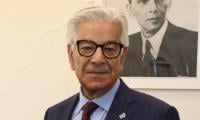Pakistan-Cuba Parliamentary Friendship Group to celebrate Cultural Week
Islamabad
The Pakistan-Cuba Parliamentary Friendship Group held a seminar titled ‘The Cuban Health Model and What Pakistan Can learn From It’ here at the Pakistan Institute of Parliamentary Services with the main objective of raising awareness about the healthcare system of Cuba that is renowned for its excellence and efficiency the world over.
The focus of the seminar was on how a small yet compact nation developed one of the greatest examples of a modern, preventive-based healthcare system that has worked wonders in the developing world.
Convener of the Friendship Group Senator Mushahid Hussain Sayed, Ambassador of Cuba Gabriel Tiel Capote, Chairman of the Foreign Affairs Committee of the National Assembly Awais Leghari and member of the Friendship Group Senator Shibli Faraz were among the keynote speakers at the seminar that was attended by government officials, health workers, students, and ministerial staffers.
In his welcome remarks, Senator Mushahid spoke of the exemplary model that Cuba had set for healthcare on a global scale. Highlighting in particular the role played by Cuba in extending aid to Pakistan when the 2005 earthquake occurred, he referred to the generous aid Cuba has extended to numerous countries in similar times of need, and talked about the strength of Cuba as a nation and as a role model in health and education for the Third World.
He also discussed briefly the upcoming activities of the Friendship Group in the coming months, including celebration of birthdays of 'Che' Guevara and Fidel Castro during the summer, and a Pakistan-Cuba Cultural Week which will be held in October.
Talking to audience, Ambassador Capote reiterated the Senator’s remarks and elaborated in further detail the cooperation extended by his country to Pakistan at the time of need in 2005.
Talking of his visit to Cuba in 2015, Sardar Awais Leghari informed the audience about his on-ground experience and particularly focused on the difference between Pakistan and Cuba’s health care system highlighting the areas where Pakistan could adapt to the successful system in place in the Latin American republic, and advocated the need for a preventive approach to healthcare in Pakistan.
“You must visit Cuba and see a strong nation. That strength comes from their strong backbone of education, health and law, which is why they were able to resist international pressure. But they did not achieve this overnight and worked extremely hard over the last few decades,” he said.
Awais Leghari also highlighted how a pilot project based on the Cuban health care system and their famed preventive system was not given the go ahead due to bureaucratic hurdles and the vested interests of pharmaceutical companies in Pakistan.
He said the Cuban healthcare system is the best among the third world countries according to the World Health Organization (WHO) and their statistics are simply amazing, especially when compared to countries like Pakistan. Cuba has an under nutrition rate of 0.7% compared to Pakistan’s 34%, we are producing a nation of mentally and physically ill people, and our health care is abysmal with one doctor serving a population of 40,000 while the ideal ratio is one per 1,000 according to prevailing WHO standards. On the other hand, Cuba has one doctor for 714 people, which speaks volumes about their commitment, said Leghari.
Dr. Miqdad Hussain, representing the Pakistan-Cuba Doctors Association, delivered a comprehensive presentation of the Cuban healthcare system, explaining in detail the structural elements and Cuban policies in this regard which had resulted in its success.
Speaking at the occasion, Christina Von Sperling Afridi, founder of the Karim Khan Afridi Welfare Foundation (KKAWF) elaborated on the drug abuse problem being faced by the younger generation and how her organisation was working to tackle the problem within Pakistan.
Senator Shibli Faraz, who has lived in South America and is a fluent Spanish speaker, highlighted the importance of such forums to help generate awareness about not only Cuban culture and society, but the culture and society of Latin America as a whole.
The seminar was well attended by representatives of the diplomatic community, serving and former government representatives, members of the Spanish speaking community in Islamabad, prominent health care professionals, as well as students from the Spanish department of NUML.
A delegation from Timor-Leste, headed by Ms Veronica Das Dores, Minister of Social Solidarity and Inclusion, on a...
Pakistani Ambassador to China Khalil Hashmi seen in this image. — APP/FileIslamabad:China-Pakistan investment and...
In this image, Child Protection Institute building can be seen. — X/@mohrpakistan/File Islamabad: Child Protection...
The National University of Modern Languages building seen in this image released on November 11, 2022. —...
President of the International Islamic University Islamabad , Prof Dr Hathal bin Hamoud Al-Otaibi, and Rector IIUI, Dr...
A representational image of a handcuffed person behind bars. — AFP/FileRawalpindi:In a significant breakthrough,...







